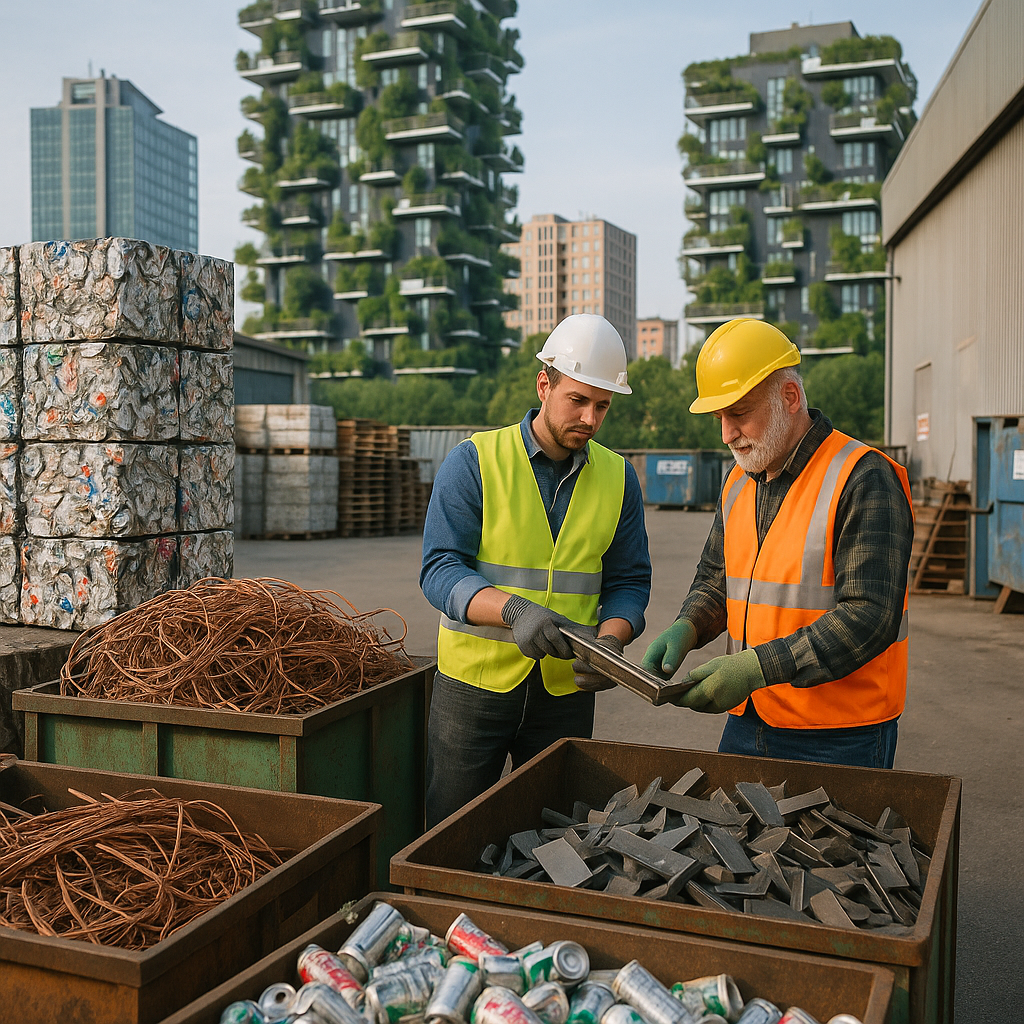5901 Botham Jean Blvd, Dallas, TX 75215
Why Is Recycling Scrap Metal Important?
May 21, 2025Did you know that recycling aluminum saves up to 95% of the energy required for primary production from raw materials? Scrap metal recycling is a powerful tool in combating resource depletion and climate change. The metal recycling industry diverts millions of tons of valuable materials from landfills each year, creating a sustainable loop of resource usage.
Recycling scrap metal directly conserves our planet’s finite natural resources. By recycling metals like steel, aluminum, copper, and brass, we significantly reduce the need for environmentally damaging mining and extraction activities. This preservation of raw materials ensures these valuable resources remain available for future generations.
Beyond environmental benefits, scrap metal recycling drives substantial economic growth. The industry creates jobs throughout the collection, processing, and manufacturing chain while generating billions in economic activity. From small local scrap yards to large-scale industrial operations, metal recycling supports livelihoods and strengthens communities across the country.
How Does Scrap Metal Recycling Benefit the Economy?
![]()
The scrap metal recycling industry serves as a vital economic driver in the United States. According to the Institute of Scrap Recycling Industries (ISRI), this sector generates over $105 billion in economic activity annually, highlighting its role as a cornerstone of economic development beyond environmental benefits.
Job creation is one of the most significant economic advantages of metal recycling. The industry directly supports more than 500,000 jobs nationwide, spanning various skill levels from collection and transportation specialists to skilled technicians operating advanced sorting equipment.
Tax Revenue Generation
Scrap metal recycling significantly contributes to government revenue at multiple levels. The industry generates approximately $4.4 billion in state and local tax revenue annually, funding essential community services like schools, infrastructure, and emergency response systems.
At the federal level, the impact is even more substantial, with the industry paying about $6.8 billion in federal taxes each year. These contributions support critical national programs, demonstrating how environmental responsibility aligns with fiscal benefits.
Local Economic Stimulation
Recycling facilities act as economic hubs within their communities. They purchase materials from local businesses and residents, creating a continuous flow of capital that stays within the region. This localized spending creates a multiplier effect as these dollars circulate through other businesses.
ISRI’s economic impact studies show that recycling activities significantly bolster local economies. When businesses sell their scrap metal instead of paying for disposal, they convert potential waste into revenue streams, improving bottom lines and strengthening community economic resilience.
Support for Related Industries
The benefits extend beyond direct employment. Scrap metal recycling supports equipment manufacturers who produce specialized machinery for collection, processing, and transportation. Each facility requires various technologies to efficiently sort and process different metal types.
Manufacturing sectors also benefit from a reliable supply of recycled materials. Using recycled metals typically requires less energy than processing virgin ore, allowing manufacturers to reduce production costs. These savings can lead to more competitive pricing and increased market share.
Global Economic Impact
The United States is the world’s largest exporter of scrap materials, generating approximately $28 billion in economic activity through exports. About 26% of processed scrap materials in the U.S. are exported to other nations for manufacturing new products.
This global reach creates additional jobs in logistics, shipping, and international trade. A study by John Dunham and Associates found that U.S. scrap exports support more than 40,000 direct jobs, with an additional 93,000 positions in supplier operations.
| Total Economic Activity | $105 billion annually |
| Jobs Supported | 500,000 jobs |
| State and Local Tax Revenue | $4.4 billion annually |
| Federal Tax Revenue | $6.8 billion annually |
| Export Contribution | 26.8% of industry activity |
| Energy Savings (Aluminum) | 95% less energy |
| Energy Savings (Steel) | 74% less energy |
The recycling industry also helps reduce reliance on costly metal imports. By recovering valuable resources domestically, countries can strengthen their economic independence while creating sustainable resource cycles. This approach becomes increasingly valuable as global competition for raw materials intensifies.
As the global economy grows, the economic contributions of the scrap metal recycling industry are likely to expand. With a rising emphasis on sustainability in business practices, this sector represents a rare alignment of environmental stewardship and economic prosperity.
What Are the Benefits of Scrap Metal Recycling for Businesses and Individuals?

Scrap metal recycling offers significant economic benefits for both businesses and individuals. Companies across various sectors can reduce operational costs, while individuals can generate extra income. These financial advantages come with environmental benefits, creating a win-win situation for all participants.
Business Benefits
For businesses in construction, manufacturing, and automotive industries, scrap metal recycling leads to cost savings. Companies can reduce waste management expenses and disposal fees by diverting metal waste from landfills. Many businesses also qualify for tax incentives by implementing recycling programs.
Environmental compliance is another key advantage. Recycling helps companies meet regulatory requirements while demonstrating corporate responsibility. This commitment to sustainability enhances brand image and attracts environmentally conscious customers and partners.
The financial impact goes beyond cost reduction. Using recycled metals in manufacturing can lower production costs compared to sourcing virgin materials. This provides companies with pricing advantages in competitive markets and reduces vulnerability to raw material price fluctuations.
Individual Benefits
For individuals, scrap metal recycling offers an accessible way to earn extra income. Household items like old appliances, outdated electronics, and car parts contain valuable metals that recycling facilities will purchase, turning potential waste into cash.
The process is straightforward. Individuals can collect scrap metal from their homes or neighborhoods and transport it to local recycling centers. These facilities pay based on metal type, weight, and current market prices. Many centers even offer pickup services for larger items.
Participation in scrap metal recycling also allows individuals to contribute to environmental protection. By diverting metals from landfills, people help conserve natural resources and reduce the energy consumption associated with mining and processing virgin materials.
Economic Impact
The collective impact of scrap metal recycling on the broader economy is substantial. According to the Institute of Scrap Recycling Industries, recycling generates over $105 billion in economic activity annually across the United States, creating hundreds of thousands of direct and indirect jobs.
Scrap metal recycling contributes to economic resilience by reducing dependence on imported raw materials. This enhances resource security and supports domestic manufacturing. The industry also stimulates innovation as companies develop new technologies to process and utilize recycled materials more efficiently.
Beyond domestic benefits, scrap metal is a significant export commodity. The United States is among the world’s largest exporters of processed scrap, generating billions in export sales annually and contributing positively to international trade balances.
| Economic Impact | Details |
|---|---|
| Annual Economic Activity | $105 billion |
| Jobs Created | 500,000+ |
| State and Local Tax Revenue | $4.4 billion |
| Federal Tax Revenue | $6.8 billion |
| Export Economic Activity | $28 billion |
| Direct Jobs from Exports | 40,000 |
| Additional Jobs from Supplier Operations | 93,000 |
Getting Started with Scrap Metal Recycling
Businesses can start by conducting a waste audit to identify recyclable metals in their operations. Setting up designated collection points throughout facilities makes separation easier. Partnering with reputable recycling companies ensures proper handling and competitive pricing for materials.
Individuals should begin by identifying common household items containing valuable metals. Copper from wiring, aluminum from cans, and steel from appliances are all recyclable. Learning to distinguish between different metal types helps maximize returns, as non-ferrous metals like copper and aluminum typically command higher prices than ferrous metals.
Both businesses and individuals should research local recycling facilities to compare prices and services. Many recyclers offer educational resources to help participants identify valuable materials and understand the recycling process. This knowledge improves efficiency and increases potential financial returns.
Conclusion: The Multifaceted Importance of Recycling Scrap Metal

Scrap metal recycling is a key component of modern sustainability efforts. By recycling metals, we conserve natural resources, significantly reduce greenhouse gas emissions, and decrease landfill waste. The environmental benefits include reduced pollution from mining activities and energy savings of up to 95% compared to producing new metals from raw materials.
The economic impact is just as compelling. Recycling creates jobs in collection, sorting, processing, and manufacturing while supporting local businesses throughout the supply chain. This circular economy approach generates revenue for individuals and companies, reduces production costs for manufacturers, and helps stabilize consumer prices across various industries.
For your business or municipality’s recycling needs, contact Okon Recycling at 214-717-4083. Our team provides comprehensive metal recycling solutions that help you contribute to environmental protection while potentially generating value from materials that would otherwise go to waste.
